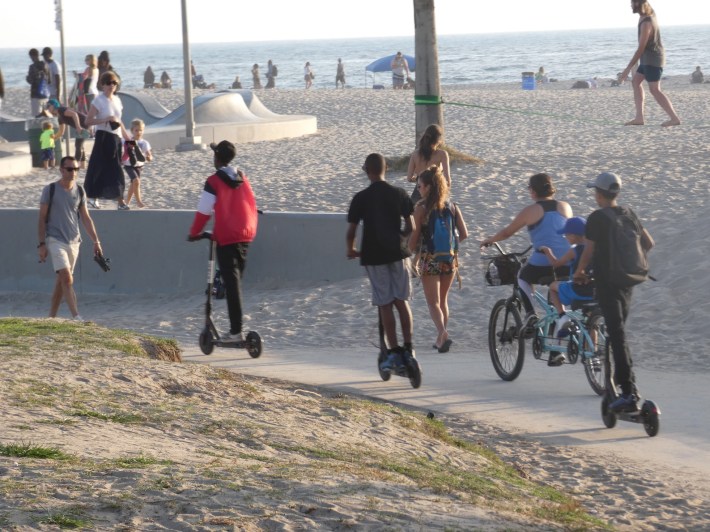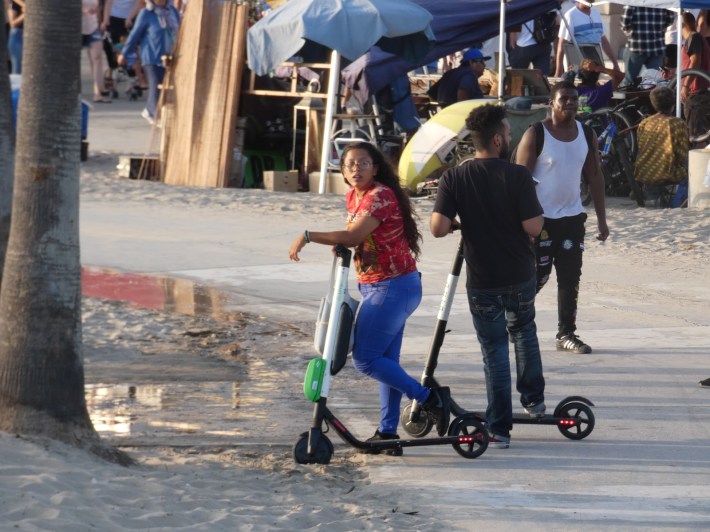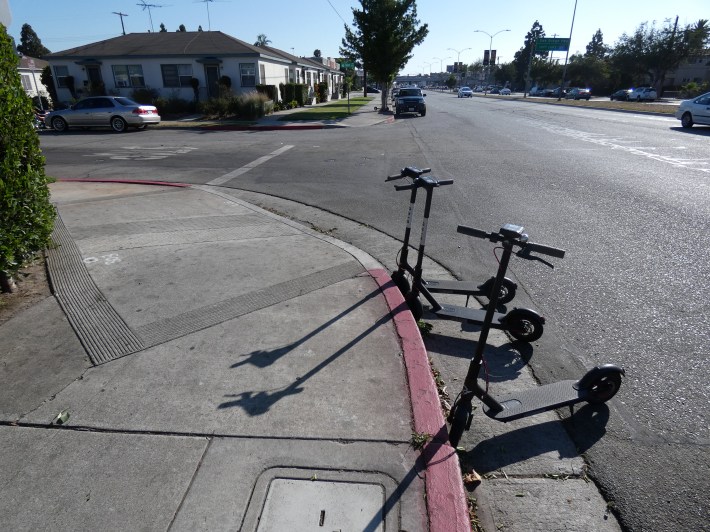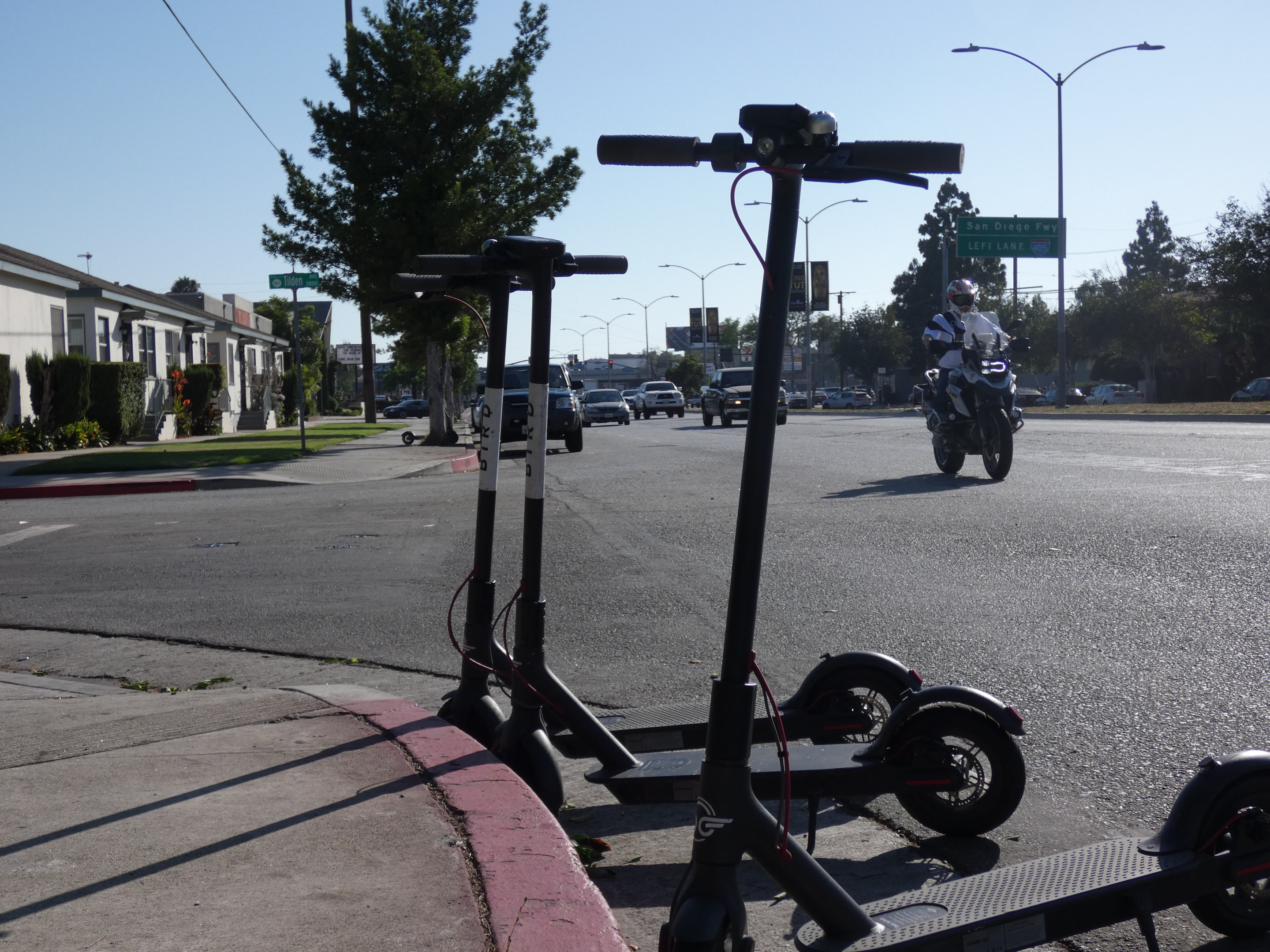[dropcap size=big]A[/dropcap] man enters a crosswalk on La Cienega, following the walk sign. A step in, he’s blindsided by a speeding vehicle — one of thousands of accidents that plague Los Angeles pedestrians each year.
Except this wasn’t a car, a motorcycle, or a bike. It was a scooter.
If you’ve been to West L.A. in 2018, you’ve probably noticed people whizzing down bike lanes on “Birds” — the stand-up electric scooters rented out by a company called Bird Rides, Inc. The app startup, known simply as Bird, was founded in mid-2017 by Travis VanderZanden, an entrepreneur coming off stints as an executive at the ride-sharing apps Lyft and Uber.
The core idea is to provide a convenient transportation option for urban trips that are too long for walking and too short for a car. Enter the electric scooter. It’s lightweight, low-profile, and with a service like Bird, very cheap.
Riders use the app to locate the GPS-equipped scooters on sidewalks or street corners and are charged $1 to unlock then $0.15 per minute of scooting after that.
“You just hop on … and you’re gliding,” graphic designer Sean Winter told L.A. Taco. “It’s like flying.”
When users arrive at their destination, they simply park the scooter in an outdoor public space.
Since the company launched last year — the first ride took place sometime in early September 2017 in Santa Monica — Bird has been expanding rapidly, blanketing sidewalks and filling up bike lanes in U.S. cities like Nashville, Milwaukee, and Atlanta.

And while a slew of competitors (see: Lime, Spin, Jump, Scoot, and GoBike) have cropped up, Bird has dominated by being first and most ubiquitous. Supporters say the convenience of Bird is paramount. Winter, for example, began using the service to tackle a roughly 5-mile commute the day after his car was totaled.
[dropcap size=big]B[/dropcap]ut critics say they're dangerous, unsightly, and unfair to businesses that have gone through proper municipal channels to operate. Bike rental shops are already feeling the Bird effect.
Joey Crowell has spent eight years renting out bikes and other rides on the Venice boardwalk. Outside the shop where he works, Beach Front Bike, Crowell describes the daily problems he sees with the scooters — first and foremost, the danger of careless riding. “People just ride them so recklessly,” he said. “I’ve seen people walking get hit by Birds.”
Throw in a widespread lack of helmet use, despite state law requiring it for all e-scooter riders, and the potential to injure riders and bystanders seems high. Social media is jammed with videos of people getting in accidents on the motorized scooters.
Bird has not released data on accident rates, but a spokesperson told L.A. Taco by email, “safety is our top priority in every city.” In Los Angeles, injuries have been prevalent enough that Cedars-Sinai Hospital published a blog post imploring riders to use “a little common sense” when Birding.
“We’re seeing [scooter-related] injuries daily … These can be life-changing injuries, and they can often be prevented,” orthopedic surgeon Natasha Trentacosta says in a statement.
Furthermore, the abundance of Birds parked in public spaces has aggravated those living and working in Bird-heavy areas. Unfortunately for those folks, pervasiveness is essentially part of the business model. After all, if a user has to walk a mile to find a Bird, it ruins the point. But with no fixed docking stations to store the scooters, things can quickly get out of hand.
“People leave Birds anywhere and everywhere,” said Crowell, exasperated.
[dropcap size=big]A[/dropcap]nti-Bird vigilantes are fighting back in a variety of ways: chucking them off buildings, cutting exposed wires, scratching off activation codes, snapping scooters in half, and even smearing feces where riders are supposed to stand.
But their annoying omnipresence isn’t even the worst of Bird for some. Crowell and other detractors take issue with the company’s business practices. “They have no respect for any other business around. This is a hotspot right here for them to drop off,” he said, motioning to the concrete outside the shop.

[dropcap size=big]E[/dropcap]ach night, Bird pays an army of contractors to collect and charge the scooters then return them to designated high-usage spots (“nests”) in the morning — perhaps a busy sidewalk, or maybe directly in front of a competitor’s shop.
“We’re here dealing with people [and] they come and try to drop off 50 Birds right there,” Crowell explained. “Like, aw hell no!”
According to Crowell, the company’s presence has affected their bottom line. “I sit here all day on my phone. We don’t get to rent out half the stuff we rent out just because of Bird,” he said. “[And] we were the first and only electric shop on Venice Beach.”
Brick-and-mortar businesses like Beach Front Bike purchase operating permits, pay property taxes, and incur other costs like security. Bird has so far avoided that web of red tape with a combination of the internet, an app, and unabashed use of public spaces.

The need for regulation couldn’t be clearer. But that proves difficult when the company has a habit of blitzkrieging unsuspecting cities. One day they’re nowhere. The next, they’re everywhere. In city after city, Bird has favored forgiveness over permission, building a customer base before paying its dues. That tactic has left officials scrambling to figure out how to deal.
[dropcap size=big]A[/dropcap] few months after their arrival in Santa Monica, the city filed criminal misdemeanor charges against Bird for operating without a license. The company pleaded no contest, agreed to get the licenses, and ate $300,000 in fines — essentially pocket change after raising $15 million while the complaint was still pending.
“We are committed to following the law and being a good corporate citizen,” the company told L.A. Taco by statement.
Some cities, like West Hollywood and Beverly Hills, have laid down outright bans while others, like Culver City, have opted for cooperation. On Tuesday, the L.A. City Council transportation committee moved to recommend the Bird's speed-limit to 12 miles per hour, amid a greater package of scooter rules in the works.
There is a logic to the scooter phenomenon — the need to gradually phase out carbon-fueled vehicles if we want to save the environment from a point-of-no-return. Marlon Boarnet, chair of USC’s Urban Planning and Spatial Analysis Department, said rentable scooters and other “light-duty e-mobility solutions” are helping to solve a long-standing problem in transportation: the “last mile.”
“There are these very short trips, oftentimes to and from transit,” he said. “If we could move those away from the automobile towards something that is light, that is environmentally sustainable … that could be a big win.”
[dropcap size=big]D[/dropcap]espite the possibilities, Boarnet also said Bird and other companies have to respect — and pay for — the right to use publicly-owned land. “The public space is a public good … [Cities have] an obligation to make sure the public is getting value from the public space.”
Boarnet suggested municipalities could collect licensing fees or enforce data-sharing in exchange for the right to park privately-owned scooters on public sidewalks. For their part, Bird has pledged to a revenue sharing program aimed at building and expanding city bike lanes. Even so, no silver bullet to satisfy all sides has emerged so far.
In the meantime, Bird and other dockless e-transit companies seem like they are here to stay, at least anywhere they aren’t completely banned. That means the struggle to adapt — for pedestrians, commuters, rental shops and city governments alike — will continue.
“There is a lot to figure out,” Boarnet said. “There’s no doubt about it.”







